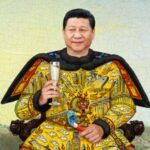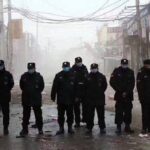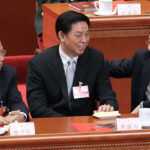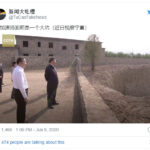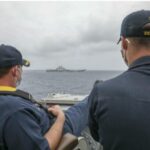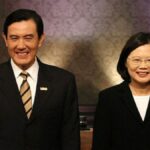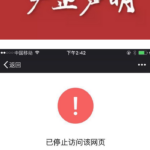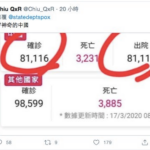大汉烟云十六州,
石家敬瑭一掌丢。
可怜华夏千年后,
再现儿皇毛和周。
“西安事变”是中国近代史的转折点。当时,已经面临被消灭命运的中共及其武装力量红军,由此得以生存,并在国军与日军血战的缝隙中得以坐大,并最终在日本失败后从国府手中夺取政权。
本刊获得的最新“西安事变”原始史料证明,早在事变前半年多,毛泽东、彭德怀就联名写信给张学良,表示要撤退前线的红军,正式提出要与张学良联合组织“国防政府与抗日联军”。在张与毛由人牵线联系上之后,才有这封毛、彭致张的信函。(不过,“12.9”学生运动领导人宋黎和刘鼎的回忆录都载有张学良加入了中共之说。而且宋黎就是介绍人。)1936年4月,周恩来同特工首领之一的李克农与张学良曾经会面。
第二封信由毛泽东、周恩来、博古、张闻天代名,日期为1936年8月,共6页。最后一页是众多国共领导人的联络假名及一些暗号。仅第1页的若干意见,就提出了如何夺取兰州,出兵绥远,进占甘、凉、肃,取宁夏,控制陕甘宁交界处的黄河东岸,通过已经安排好的新疆配合,最后打通苏联的具体用兵计划。该计划显示,从目的到具体措施,它都与抗日无关。它旨在全力打击以蒋中正为首的国民政府的抗日力量,从而有利于苏联及日本。这就表明,西安事变是一起卖国事变。
第三份引人注目的文件共有八条,一方由毛泽东签字,另一方应由张学良签字。据称由于“事变发生而未来得及签字。其内容是张与毛的相互配合与协调的原则。其中第一条的甲、乙项是建立“联合战线”,丙项则是“建立中华民主共和国”,即他们联合的目标是推翻中华民国。这份以抗日为名的“协定”已经送到张之手,还没有来得及与毛并列签字,蒋已抵达西安,事变随即发生了。
第四份文件的结尾,是张学良在南京被扣之后佯装“自省”的冠冕堂皇的表白。他似乎忘了他早就暗联毛泽东中共,开始了推翻中华民国,卖国予苏联,从而在根本上有利于日本的阴谋活动。这些文件,白纸黑字,赫然在目。
至于李宗仁的文件,则与西安事变无关。那是1933年两广对抗南京国民政府之事。而到1935年,两广已与国民政府达成协议,共同参加了1935年的中国国民党第五次代表大会,决定先清除中共,然后一致对日作战。西安事变前夕,两广为剿灭中共,已派大军北上。只是事变发生,才改变了这一历史进程。
下面这些就是张学良的印度飞机驾驶员海岚.里昂所收藏的有关西安事变的重要私人档案。当时他把它们带到香港,一放就是大半个世纪。他的后人打算出售,但是张学良的儿子并无积极性收回,一拖再拖。斯坦福大学胡佛研究所出价十几万美元,后来中国大陆西安文管所得知,竟以二十多倍的价钱买走。还里刊布的还不是全部,只是张学良和毛泽东、彭德怀的协议等要件。
以下图片皆可点图看大图:
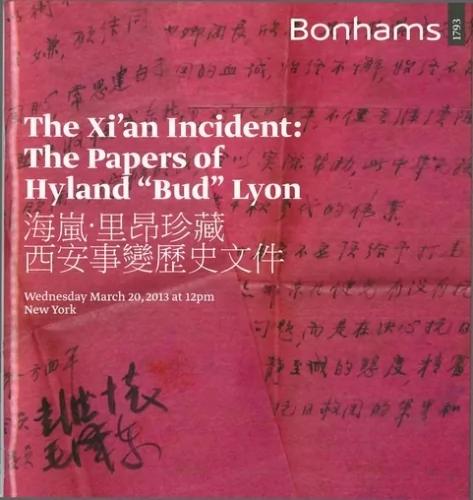
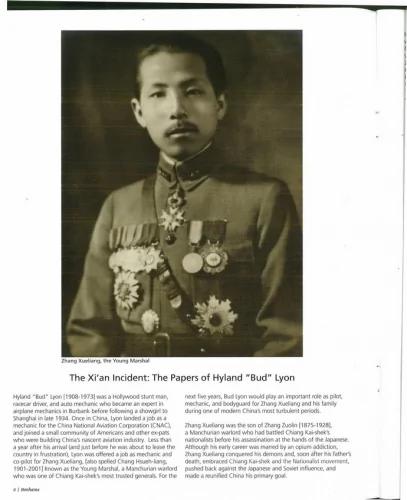
made it very clear thatChiang Kai-shek was fully in control of the Nationalist army, and that any detente would be impossible without Chiang’s cooperation. Further complicating the issue was the fact that Chiang considered the Communists the greater threat to him, as opposed to the Japanese, whom he considered a minor annoyance.
As the year went on, Chiang became frustrated and then suspicious of the Young Marshal’s lack of progress against the Communist forces, so much so thatZhang staged mock battles and engagements with the Communists as a cover. In October of1936 Chiang Kai-shek announced that he would step up his”suppression campaign” against the Communists. At nearly the same time, the Japanese army invaded and was repulsed in the Suiyuan Campaign, giving many inChina the hope that Japan could be successfully resisted.
In December Chiang Kai-shek flew to Xi’an to test the loyalty of the Kuomintang(KMT) forces under Zhang, and to personally lead an attack on nearby Communist forces. Zhang Xueliang and another General, Yang Hucheng, tried desperately to convince Chiang to join forces with the Communist army to resist the Japanese. When they were unable to elicit a compromise, they took matters into their own hands, and on December12,1936, Zhang and his forces stormed Chiang’s headquarters and arrested Chiang, triggering the Xi’an Incident.
The Xi’an Incident was reported at the time as a treasonous coup by Zhang, but it is fairer to describe it as a”forced negotiation process.” Chiang Kai-shek was kept under house arrest for nearly two weeks, during which time Zhang and Yang asked the Communists to send a delegation to Xi’an to discuss the fate of China. For much of the time Chiang resisted negotiations, until it became clear that his life and freedom depended upon it.
On December17, the CPC delegation, including Zhou Enlai, arrived, but negotiations with Chiang were not fruitful. On December22, Madame Chiang Kai-shek and her brother T.V. Soong arrived to continue negotiations, and on December24, an informa丨 agreement was reached(though Chiang Kai- shek never officially signed any peace documents). Hostilities between the two sides, however, immediately ceased, allowing for a successful resistance to Japan.
After Chiang’s release, Zhang Xueliang was arrested, tried in a military court, and sentenced to10 years for his part in the incident, though he wound up spending nearly the rest of his life(until1989) under house arrest. In the immediate aftermath of the Xi’an Incident, Zhang asked HylandLyon to act as bodyguard to his wife, Edith Chao, and young son, Bobby. For the next5 years, while Zhang was in prison in Shanghai, Lyon piloted the family about, took care of many important domestic transactions and accompanied them on their travels. He finally left China in1941, returning to Los Angeles with6 steamer trunks full of his personal collection of photography and documents, in addition to a small lockbox of documents.
海岚•里昂(Hyland”Bud” Lyon)
西安事变相关文件
海岚•里昂先生曾做过特技演员、赛车选手及修车师。移居中国之前,他曾在洛杉矶近郊的柏班克(Burbank)担任专业飞机维修师,随后在1934年因追随一名爱慕已久的女艺人搬往中国上海居住。到了中国之后,里昂先生成为中国航空公司(CNAC)飞机技师,与当时身处中国的一小群美侨与外侨共同建立起中国的航空事业。来到中国一年之后,就在他正要放弃回国之时,
东北军阀“少帅”张学良(亦是蒋介石身边的一名将领)邀请他担任机械师与飞机副驾驶。在接下来的五年中,里昂先生便受托一直待在张学良及其家人身边,担任张学良的飞机驾驶、机械师与保镳等重要角色,与其共同度过了这段中国近代史上最为混沌的时光。
张学良的父亲是奉糸军阀领袖张作霖(1875-1928),曾与蒋介石的国民军对抗,后遭日本关东军暗杀。张学良年少玩事不恭,沉迷烟毒,但在父亲遇刺后一改前非,与蒋介石合作抵曰抗俄,致力于中国的统一大业。
一九三六年四月,张学良背着蒋介石与周恩来谈判,希望结束国共敌对状态。张学良当时虽然一直希望凑成国共合作,能够停止内斗并共同抗日,但却向中国共产党清楚表明国民军应由蒋介石全权掌控,而任何的停战协议也必须得到蒋介石的同意才能签署。然而问题在于蒋介石仇共远远大于仇日,认为曰本事小,共产党才是心腹之患。
几个月下来,张学良在剿匪方面毫无进展,使得蒋介石先是恼怒,并开始怀疑张学良的忠诚。张学良因而与共军佯装作战,以掩盖谈判实情。一九三六年十月,蒋介石突然亲率部队大力加强剿共,并且又在绥西战役中大败日军,使得国军抗日士气大振。该年十二月,蒋介石飞抵西安亲自领军剿共,同时也是测试张学良部队的忠诚。蒋抵达西安后,张学良与杨虎城两位将军竭力劝说蒋介石与共产党联手抗日,但蒋介石始终不肯让步。一九三六年十二月十二日,张学良手下冲入蒋介石总部将其逮捕,西安事变由此展开。
西安事变在当时被定调为张学良背党叛国事件,然而或许应该视为迫使蒋介石上谈判桌的一种手法。蒋介石连续两周被拘禁,而张学良与杨虎城则趁此机会要求共产党派遣代表前来西安共商国家前途命运。蒋介石直到生命与自由遭到严中威胁之际才愿意上谈判桌。
十二月十七日,共产党派遗周恩来等人前来西安协商,但谈判未果。十二月二十二日,蒋宋美龄及其兄宋子文抵达西安继续协商,直到十二月二十四日才达成协议》当时蒋介石并未签署任何协议书,但国共敌对状态立即冰释,以便能够协力抗曰。
蒋介石被释放后,张学良立即被逮捕,并送军法审判,结果判十年有期徒刑,但最终以软禁形式度过终身,直到1989年才被释放。西安事变过后不久,张学良托里昂先生担任张妻赵一荻与幼子张闾琳的贴身侍卫。接下来的五年,张学良在上海服刑,而里昂先生协助赵一荻母子处理重要家务,并驾驶飞机带她们四处奔走。里昂先生在一九四一年离开了中国,带着装载个人文件与相片的六大行李箱以及受张家所托储存私密物件的保险箱回到了洛杉矶。
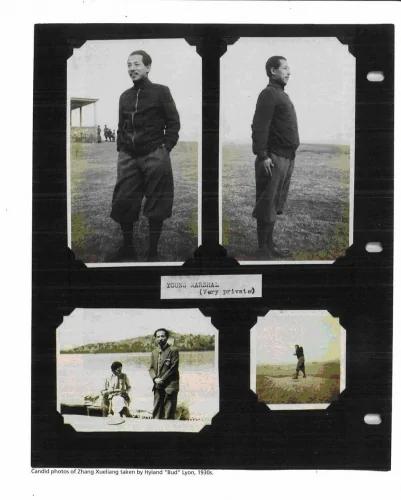
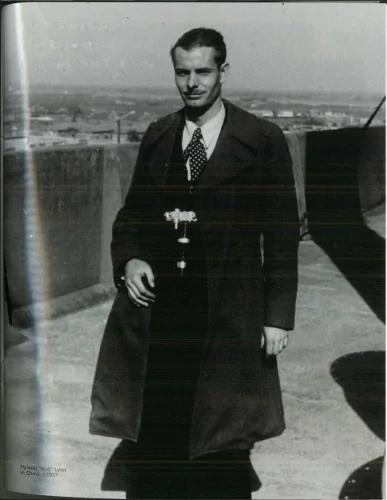
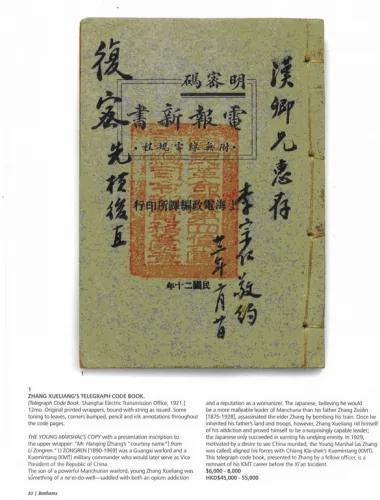

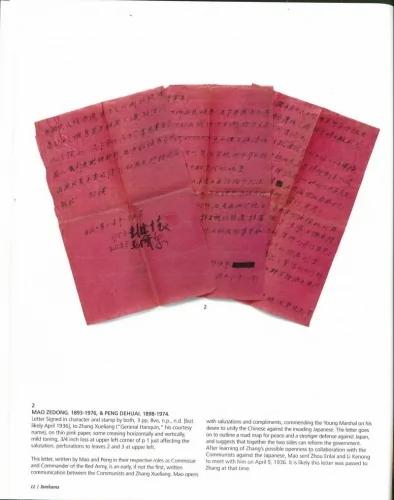
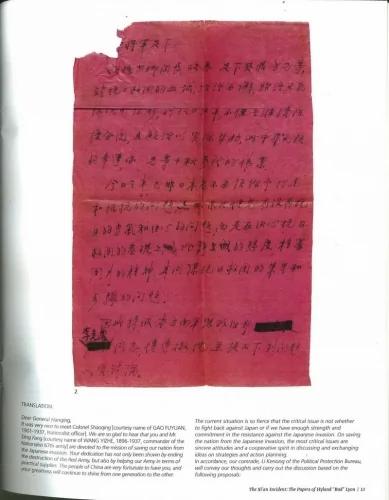


(以下是上面红色信笺内笔迹的内容)
将军足下:
顷晤少卿团长,欣悉足下与鼎方对抗日救国的血诚始终不懈,始终不为环境所打动,对抗日红军,不仅无继续阻扰企图,且愿给以实际帮助,此中华民族的幸运,亦兄等千秋万代的伟业。
今日之事,也非日本应不应该给予打击和抵抗的问题,亦非东北健儿有没有抗日的勇气和决心的问题,而是在决心抗日救国的基础上,以冷静至诚的态度,谨慎(原文作精审)周到的精神,来同盟抗日救国的策略和步骤的问题。
因此特派本方面军政治部李克农同志,传达微忱,并提出下列问题以资讨论。
一、从本月十六日起,我军即下令撤去甘泉、虏施之围,双方停止敌对行动,同盟抗日。
二、目前各就原防,做抗日的一十万准备。
三、各派全权代表商定停战办法,以及抗日的作战协定——时间地点再商定。
四、我们提议组织国防政府与抗日联军,汉卿兄有何意见?
五、在抗日问题上,东北军可能采取的最低限度的步骤,这一步骤不论是积极的或是消极的,汉卿兄有何意见?
当然,上述讨论,只是初步的协商,仍望足下坚定其与日本不共戴天之誓,深切了解红军抗日之诚,达到在抗日联军战线上,共同奋斗。
事急矣,时亦迫矣。万方多难,国势险危,华北沦亡,民族疹瘁,枕干戈以卫社稷,谁为抗日之雄,息箕豆相煎之嫌,愿结同仇之谊。知足下家仇国耻,常思建白于国人。我们是断铁斩钉,坚决收复我东北,因夙致意,不尽所怀,引颌南天,伫侯明教。
敬致勋祺
中国工农红军第一方面军
司令员彭德怀
政治委员毛泽东

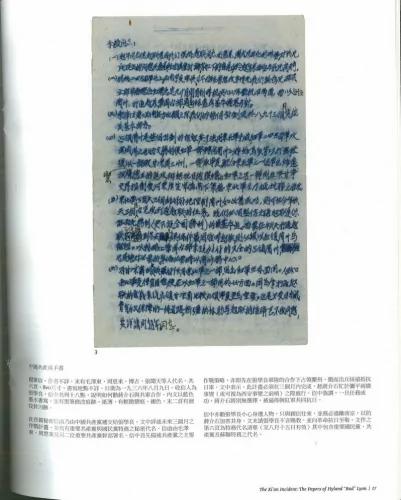
(以下是上面l蓝色笔迹的内容)
李毅(按:即张学良)同志(按:称同志):
一、赵年(按:即潘汉年)同志从赵联(按:即苏联)返回,根据赵联同志意见,国内及西北的形势,对于兄所提出的问题及意见,经过慎重讨论,有如下的意见,即令赵年来西安与我兄商酌。
二、根据二、四方面军北上,西南事变发展,日本对绥、蒙进攻情况,我们认为兄部须立即相约配合红军,选定九、十月间的有利时机,决心发动抗日局面,而以占兰州、打通赵苏,巩固内部,出兵绥远为基本战略方针。
三、乘蒋注意西南方面无力北顾之际,我们的整个计划,须对于八、九、十三个月完成基本部分。
四、占领兰州是整个计划的枢纽。其方法用东北军守城,红军二、四方面军攻击城外之毛炳文。胜利后红军一部转向兰州上游,给马步芳以打击;然后以一部取甘、凉、肃,一部取宁夏,配合东北军之一个军出绥远,抵御德王的进攻,树起抗日的旗帜。红军之另一部则在陕甘宁交界控制黄河东岸,并准备南下策应东北军主力抵抗蒋的进攻。
五、东北军以致其三个师好好地控制兰州,如此着成功,则可在今年秋天三个月内,完成打通赵联的任务。我们必须坚信打通赵联是保证西北胜利(更不说全国胜利)的基本点。而要在秋天打通赵联,不使推到冬天气候条件最困难时去做,则必须以占领兰州为枢纽。此战略就巩固内部来说,好好地完全占领兰州,也是绝对必要的,准备必要时以兰州中心。
六、对甘、凉、肃的占领,最好使用东北军之一部,留出红军在外面用;但如东北军觉有困难,便应以红军之一部用于此方面。因为拿打通赵联的意义来说,占领甘、凉、肃比占领宁夏更为重要。这是不受日本威胁,有永久保障的一条路。新疆的协助与赵联的接触,已不成问题,其详情问赵年同志。
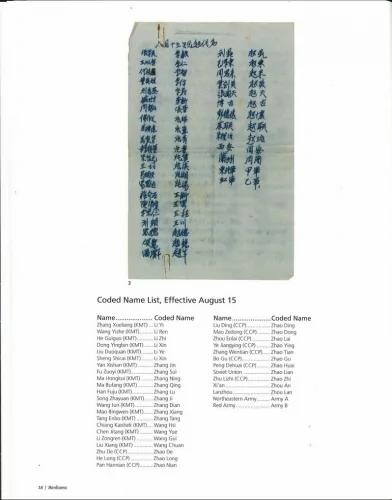

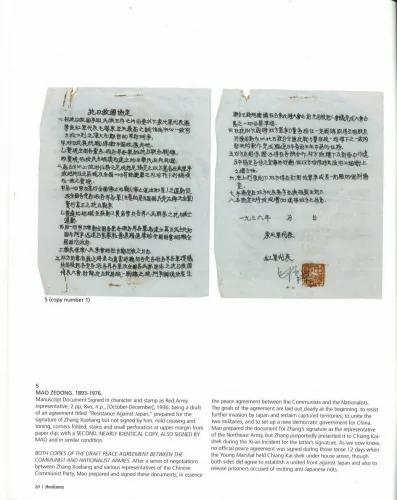


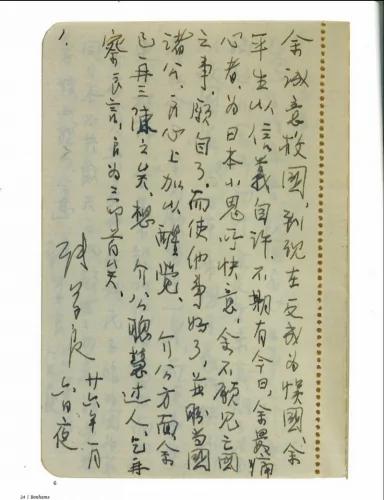
ZHANG XUELIANG.1901-2001.
Autograph Manuscript Signed in character5 times,8 pp,16mo, n.p.,”night January6,26th year of the Republic”(i.e.1937), housed in a small red leatherette journal, very minor wear.
THE YOUNG MARSHALS FAREWELL MESSAGES, WRITTEN ON THE PLANE RIDE BETWEEN XI’AN AND NANJING. After the release of Chiang Kai-shek on December25, Zhang Xueliang chose to return to the capital with the Generalissimo. Once there, Chiang had Zhang arrested and tried in a military tribunal, where he was convicted and sentenced to ten years(but Wound up spending most of the rest of his life in confinement).
丁his document, a series of messages to the people of China, his family and friends, reveals Zhang’s intention to kill himself rather than be subjected to the unknown humiliation that awaited him.
From the first part, translated:”I sincerely have faith in the salvation of the country; however my conduct has been anti-national. Having vowed to be a faithful and trustworthy man, I never expected to let this happen. The most heartbreaking thing is seeing the Japanese find pleasure in their oppression over the Chinese. Rather than witness the fall of our country,
I will take my own life. Hopefully this will end some problems. I wish the leaders of our country to be morally conscious with an awareness of their actions. I have repeatedly expressed my thoughts to Mr. Chiang who possesses extraordinary intelligence. If Mr. Chiang would reconsider my opinions, I would greatly appreciate it
To his family, Zhang writes:”I your brother(father) was straight forwardly reckless. I worked for the salvation of our country, however had no good solutions. The Northwest incident was never planned. Therefore, I came to the capital alone hoping to end the problems. My intention was to save the country from Japanese imperialism and had never expected to let things turn out like this. I do not want to stay alive dfid let other problems arise because of me. Even though I may not have directly caused their death, I am indirectly responsible. I take total responsibility for all the problems. For our country and our families, all the Zhang descendants will swear to take revenge against Japan and will not forget this in the future.” The rest of the document, addressed to T.V. Soong, Jimmy Elder, General Tan Enbo, and two others, gives detailed instructions regarding the dispensation of Zhang’s vast estate.
$40,000-60,000 HKD$300,000-400,000
张学良(1901-2001)手书
亲笔签名信,共五枚签名,共八页,16mo尺寸,书写地点不详。日期为中华民国二十六年(一九三七年)一月六日。置于红色小皮套内,磨损极轻微。“少帅”张学良由西安飞往南京途中所写之告别信。
张学良十二月二十五日将蒋介石释放后,选择与蒋介石一同返回南京。抵达南京后,蒋介石立即下令将张学良速捕,以军法审判。张学良被判十年有期徒刑,但最终以软禁形式度过终身。
本文件为张学良写给亲友及全中国人民的一糸列诉求,文中表示宁可自尽也不愿意接受屈辱。
文件第一部分的大意如下:余诚意救国,到现在反成为误国。平生以信义自诩,不期有今曰。余最痛心者,为日本小鬼所快意。余不愿见亡国之事,愿自了,而使他事好了,并盼当国诸公良心上加以醒觉。介公方面,余已再三陈之矣。想介公聪慧过人,乞再察良言,良为三叩首矣。
张学良叮嘱家人部分概略转述如下:兄(父)生性直鲁,救国有心,为事之计,西北端起,非余所初计。余支身来京,期了去_,以救国家身,勿曰本帝国主义所快,不期有今曰,余不愿留求一身,而使事变,更生枝节,余虽不杀伯仁,伯仁因我而死,余当负其责也,愿张氏子孙为国为家,同日本不共戴天之仇,愿世世勿忘,传弟、妹、子、姪、女、甥、儿全体。
文件末尾则是向宋子文、詹母士•奥德(Jimmy Elder)、谭恩波将军及另两人交代张家财产的分配。

Shanghai, c.1936
7
LYON, HYLAND”BUD.”1908-1973.
A large collection of photographs, correspondence, and memorabilia, much of it relating to Lyon’s years in China,1934-1941, but also including early and late material, as follows:
Box1
Album of Lyon’s early years, with photographs of him as an infant, child and young man, along with early letters to his grandmother.
Album of Lyon’s Hollywood years,1925-1934, including film stills and images of him as an auto mechanic, actor, stunt man, and pilot.
LYON’S CORRESPONDENCE FROM CHINA:89 letters(Autograph Letters Signed and Letters Signed), approximately250 pp,4to and8vo, various places in China and the Pacific, September14,1934 to July21,1940, on various letterheads including the CNAC, Nan-Hu Airfield, and several ocean liners, most to his grandmother but a few other correspondents, being a dear, detailed first-hand narrative of his years in China in the service of the CNAC, the Young Marshal, and others.
Box2
A large collection of documents and photographs relating to CNAC, the aviation ground school at Nan-Hu Airfield, and his work post-Xi’an Incident with the Young Marshal’s family. Includes correspondence and a large series of telegrams sent back and forth between Lyon, Julius Barr, James Elder, and other influential figures.
4 small metal luggage tags stamped”Marshal Chang Hsiao Liang” and individually numbered(26,129,172,300).
11 Autograph Letters and Notes Signed by Edith Chao, to Mr. Lyon, along with several canceled checks also signed by her, and together with a checkbook bearing an inscription identifying it as the Young Marshal’s.
Box3
A collection of early photos relating to Lyon’s childhood and film career. Approximately20 Autograph Letters Signed of Dee St. Claire, the showgirl Lyon followed to China, c.1935; together with a signed photograph of St. Claire.
A small accordion file with printed cards, many annotated, of Lyon’s China contacts.
Typed transcriptions of Lyon’s letters, likely by his grandmother Jane Hunter, housed in blue3-ring binder.
A collection of Lyon’s auto and pilot’s licenses from China, etc.
A large piece of shrapnel removed from Lyon’s body,1930s.
A small address book and journal, dated March-July1937, describing an illness and hospital stay, plus his movements about Hangkow with Elder and Julius Barr.
Box4
Original correspondence from Jane C. Hunter, Lyon’s grandmother,
1930s-1950s, covering his years in China. Over200 letters containing much news of family and life in US, commentary on Bud’s letters home. Trunk1
213-ring binders featuring Lyon’s typed narrative illustrated with photographs and clippings, titled”China in the Raw” and covering the years1935-1941, quoting heavily from his own writings as well as news sources.
Approximately4000 frames of35 mm film negatives housed in9 red leatherette albums and consecutively numbered: images of Lyon’s years in China.
3 red leatherette albums, oblong8vo, each with mounted gelatin silver prints of Lyon’s images, various sizes(2×3 inches to5 x7 inches), including images of city and country life in China in the1930s, the various CNAC airplanes Lyon worked on, Chinese in formation, and atrocities committed by Japanese troops, among others.
Trunk2
A large collection(exceeding2000) of loose silver gelatin prints of Lyon’s photos of China, most4x5 inches, many with his photographer’s stamp, some identified in pencil. Views of people, places, and events in China,1935-1941.
Trunks3-4
Lyon’s personal papers from his later years, including documentation relating to patent efforts and machine shop business, personal correspondence and photographs. Together with a large collection of clippings and newspapers from his years in China.
Other items include: Lyon’s CNAC pilot’s blazer,3 lithographed CNAC posters from the period, and a set of embroidered CNAC”wings”; a collection of travel labels from passenger liners and hotels throughout the far east; a collection of stamps of the period; a calligraphic wall hanging; and a canister of film featuring an early newsreel biography of the Young Marshal.


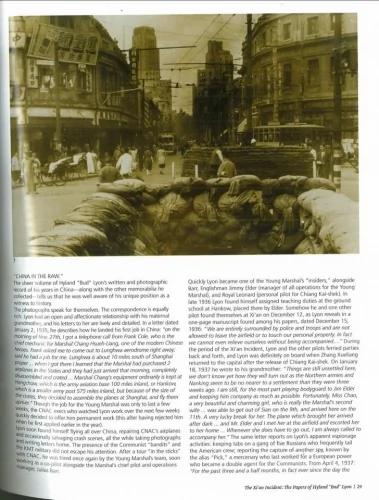
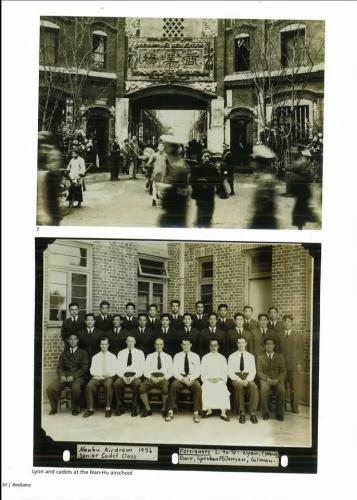


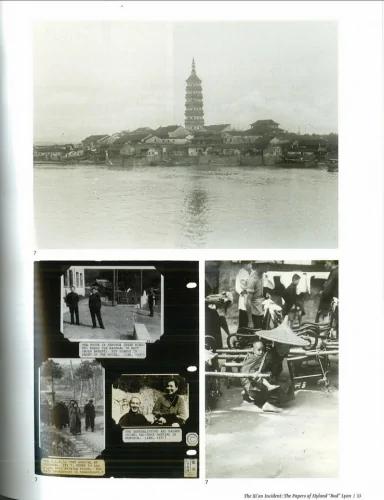


.
责任编辑: 李广松 来源:纵览中国 转载请注明作者、出处並保持完整。

